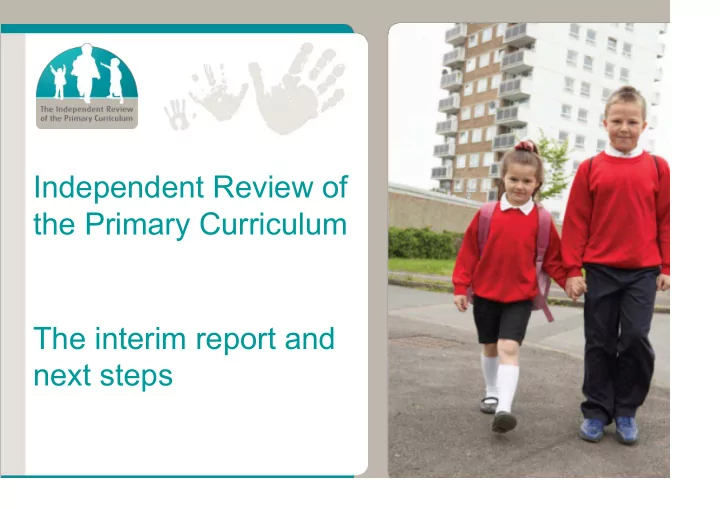

Independent Review of the Primary Curriculum The interim report and next steps
The Remit To develop a primary curriculum that will ensure all children: • Build on their prior learning in the EYFS; • Develop the essential reading, writing, numeracy and ICT skills they need to learn and develop; • Acquire the range of personal, social and emotional attributes essential to their health and wellbeing and to life as a responsible citizen in the 21 st Century; • Experience a broad and balanced entitlement to learning; • Experience a smooth transition at the key stages of their education
Key questions the Review has considered How can we: • Meet the rising demands of society on primary schools? • Reduce central prescription and increase flexibility for schools to localise the curriculum? • Give teachers more freedom to exercise professional judgement about how they teach? • Give teachers greater flexibility for responding to children’s different but developing abilities? • Make curriculum planning more straightforward and manageable?
What does the interim report explore? A curriculum design based on: • A clear set of culturally derived aims and values; • Explicit opportunities for subject teaching and cross-curricular studies from the principal areas of our national culture and achievement; • Explicit opportunities throughout to develop good attitudes to learning and children’s personal development;
What does the interim report explore? A curriculum design based on: • Securing high achievement in the key areas of literacy, numeracy and ICT; • Design principles that enable schools to fashion a rich learning environment to engage, motivate and challenge them and their pupils.
A rationale for the curriculum The curriculum is: • A cultural construct of what we as a nation value most highly for our children; •Defined as the knowledge, skills, understanding and attitudes that primary children should learn at school; •Dynamic rather than static subject to well-managed, periodic change in response to national and global developments •Recommend EYFS and the statutory curriculum are reviewed at agreed intervals as a whole, rather than as separate phases reviewed out of sequence.
How should learning be organised? Part 2 The Review wants to encourage: • High quality subject teaching to teach essential content discretely and directly; • Cross-curricular studies that give children ample opportunities to use and apply their developing subject, knowledge, skills and understanding; • Children to deepen their understanding. For example deepen their understanding of number, through opportunities to use and apply number knowledge and skills in science and technology.
4 types of Curriculum organisers
Aims and values Educational aims and values generally recognise two mutually beneficial sets of outcomes: •Those for the benefit of the individual; •Those for the benefit of society; •Aims and values must be valid not only for the here and now but also for the foreseeable future
Aims of the secondary curriculum The Review will examine whether the three aims of the secondary curriculum can be applied to the primary phase. The secondary aims are to enable all children to become: •Successful learners who enjoy learning, make progress and achieve; •Confident individuals who are able to live safe, healthy and fulfilling lives; •Responsible citizens who make a positive contribution to society
The essentials of primary education With the 3 aims, literacy, numeracy, ICT and personal development will be at the heart of the new curriculum. They will be used and applied across the curriculum through each area of learning
The 6 areas of learning • Understanding English, communication and languages; • Mathematical Understanding; • Scientific and technological understanding; • Human, social and environmental understanding; • Understanding the arts and design; • Understanding physical health and well-being
Personal Development The Review’s remit is to build a simpler and more integrated framework for personal development. Respondents have suggested it includes skills, attitudes and attributes such as: –Teamwork skills and conflict resolution; –Empathy and tolerance; –Social and emotional skills; –Respect for others and the environment; and –Self-respect and confidence There will be explicit opportunities secure these aspects of personal development across the curriculum through each area of learning;
Next Steps • Seeking comments on the interim report until the end of January; • QCA to produce draft programmes of learning for informal consultation beginning in late January; • QCA running a series of regional conferences between January and March; • The final report will consider the level of support and guidance primary schools will need to successfully introduce the new curriculum in 2011; • QCA will develop a new website with materials and tools to help schools with curriculum planning and design.
Recommend
More recommend